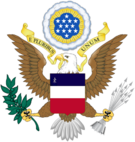Progressive Party of Ibica
Progressive Party | |
|---|---|
 | |
| Chairperson | Misty Aston (AL) |
| House Minority Leader | Brant Sanderson (CT) |
| Senate Minority Leader | Carl Bunker (Angola) |
| Founded | January 8, 1828 |
| Headquarters | 430 South Capitol St., Willmington |
| Student wing | Ibican College Progressives Ibican High School Progressives |
| Youth wing | Young Progrssives of Ibica |
| Membership (2018) | |
| Ideology | Majority: • Modern liberalism • Social liberalism Factions: • Centrism • Conservatism • Democratic socialism • Left-wing populism • Progressivism • Social democracy |
| Colors | Blue |
| Seats in the Senate | 4 / 20
|
| Seats in the House | 60 / 235
|
| State Governorships | 3 / 10
|
| Territorial Governorships | 0 / 3
|
| This article is part of a series on the |
| Politics of the United States of Ibica |
|---|
 |
The Progressive Party is one of the two major contemporary political parties in Ibica, along with its main rival, the Conservative Party. The Progressive Party's philosophy of modern liberalism advocates social and economic equality, along with the welfare state. It seeks to provide government regulation in the economy. Policies such as environmental protection, support for organized labor and labor unions, the introduction of social programs, affordable college tuition, equal opportunity, and consumer protection form the core of the party's economic policy. On social issues, it advocates campaign finance reform, LGBT rights, police and immigration reform, stricter gun laws, and the legalization of marijuana.
Current structure and composition
National committee
The Progressive National Committee (PNC) is responsible for promoting Progressive campaign activities. While the PNC is responsible for overseeing the process of writing the Progressive Platform, the PNC is more focused on campaign and organizational strategy than public policy. In presidential elections, it supervises the Progressive National Convention. The national convention is subject to the charter of the party and the ultimate authority within the Progressive Party when it is in session, with the PNC running the party's organization at other times.
State parties
Each state also has a state committee, made up of elected committee members as well as ex officio committee members (usually elected officials and representatives of major constituencies), which in turn elects a chair. County, town, city and ward committees generally are composed of individuals elected at the local level. State and local committees often coordinate campaign activities within their jurisdiction, oversee local conventions and in some cases primaries or caucuses and may have a role in nominating candidates for elected office under state law.
Ideology
Centrists
Centrist Progressive, or New Progressive, are an ideologically centrist faction within the Progressive Party. They are an economically liberal and "Third Way" faction.
The New Progressive Coalition is a pro-business, pro-growth and fiscally conservative congressional coalition. Compared to other Progressive factions, they are mostly more supportive of the use of military force, are more supportive of free trade and are more willing to reduce government welfare as indicated by their support for welfare reform and tax cuts.
Conservatives
A conservative Progressive is a member of the Progressive Party with conservative political views, or with views relatively conservative with respect to those of the national party.
Liberals
Social liberals (modern liberals) and progressives constitute the majority of the Progressive voter base. Liberals thereby form the largest united demographic within the Progressive base. According to the 2012 exit poll results, liberals constituted 25% of the electorate, and 86% of Ibican liberals favored the candidate of the Progressive Party.
A large majority of liberals favor moving toward universal health care, with many supporting a national single-payer system. A majority also favor diplomacy over military action, stem cell research, stricter gun control and environmental protection laws as well as the preservation of abortion rights. Immigration and cultural diversity is deemed positive as liberals favor cultural pluralism, a system in which immigrants retain their native culture in addition to adopting their new culture. They tend to be divided on free trade agreements and organizations, with some seeing them as more favorable to corporations than workers. Most liberals oppose increased military spending and the mixing of church and state.
This ideological group differs from the traditional organized labor base. According to the Pew Research Center, a plurality of 41% resided in mass affluent households and 49% were college graduates, the highest figure of any typographical group. It was also the fastest growing typological group between the late 1990s and early 2000s. Liberals include most of academia and large portions of the professional class.
Progressives
Progressives are the most left-leaning, pro-labor union faction in the party who have long supported a strong regulation of business, social-welfare programs and workers' rights. The Congressional Progressive Caucus is a caucus of the more progressive Progressives and is the single largest Progressive caucus in the House of Representatives.
Political positions
- Economic policy
- Expand social security and safety net programs.
- Increase top capital gains tax and dividend tax rates to above 28%.
- Across the board tax-cuts for the low and middle class and small businesses.
- Change tax rules to not encourage shipping jobs overseas.
- Increase federal and state minimum wages.
- Modernize and expand access to public education and provide universal preschool education.
- Support for expanded universal health care.
- Greater investment in infrastructure development.
- Increase investments in scientific and technological research and development.
- Expand the use of renewable energy and diminish the use of fossil fuels.
- Implement a carbon tax.
- Uphold labor protections and the right to unionize.
- Reform the student loan system and allow for refinancing student loans.
- Expand free college.
- Mandate equal pay for equal work regardless of gender, race, or ethnicity.
- Social policy
- Decriminalization or legalization of marijuana.
- Uphold network neutrality.
- Implement campaign finance reform.
- Uphold voting rights and easy access to voting.
- Allow legal access to abortions and women's reproductive health care.
- Reform the immigration system and allow for a pathway to citizenship.
- Support for gun background checks and stricter gun control regulations.
- Improve privacy laws and curtail government surveillance.
- Opposition to the use of torture.
- Recognize and defend Internet freedom worldwide.
Economic issues
Equal economic opportunity, a base social safety net provided by the welfare state and strong labor unions have historically been at the heart of Progressive economic policy. The welfare state supports a progressive tax system, higher minimum wages, social security, universal health care, public education and public housing. They also support infrastructure development and government-sponsored employment programs in an effort to achieve economic development and job creation while stimulating private sector job creation. Additionally, since the 1990s the party has at times supported centrist economic reforms, which cut the size of government and reduced market regulations. The party has continuously rejected laissez-faire economics as well as market socialism, instead favoring Keynesian economics within a capitalist market-based system.[citation needed]
Fiscal policy
Progressive support a more progressive tax structure to provide more services and reduce economic inequality by making sure that the wealthiest Ibicans pay the highest amount in taxes. Progressive support more government spending on social services while spending less on the military. They oppose the cutting of social services, such as Social Security, Medicare, Medicaid and various other welfare programs, believing it to be harmful to efficiency and social justice. Progressive believe the benefits of social services in monetary and non-monetary terms are a more productive labor force and cultured population and believe that the benefits of this are greater than any benefits that could be derived from lower taxes, especially on top earners, or cuts to social services. Furthermore, Progressives see social services as essential towards providing positive freedom, i.e. freedom derived from economic opportunity.
Renewable energy and fossil fuels
Progressives have supported increased domestic renewable energy development, including wind and solar power farms, in an effort to reduce carbon pollution. The party's platform calls for an "all of the above" energy policy including clean energy, natural gas and domestic oil, with the desire of becoming energy independent. The party has supported higher taxes on oil companies and increased regulations on coal power plants, favoring a policy of reducing long-term reliance on fossil fuels. Additionally, the party supports stricter fuel emissions standards to prevent air pollution.
Social issues
The modern Progressive party emphasizes egalitarianism and social equality through liberalism. They support voting rights and minority rights, including LGBT rights, multiculturalism and religious secularism. A longstanding social policy is upholding civil rights, which affect ethnic and racial minorities and includes voting rights, and equal opportunity. Ideological social elements in the party include cultural liberalism, civil libertarianism and feminism. Other Progressive social policies are internationalism, open immigration, and women's reproductive rights.
Legal issues
Gun control
With a stated goal of reducing crime and homicide, the Progressive Party has introduced various gun control measures. However, some Progressives, especially rural Progressives, favor fewer restrictions on firearm possession and warned the party was defeated in the 2016 presidential election in rural areas because of the issue.
Death penalty
The Progressive Party supports the death penalty far less than the Conservative Party. Although most Progressive in Congress have never seriously moved to overturn the rarely used federal death penalty. Progressives have led efforts to overturn state death penalty laws, particularly in Albion and in Angola. They have also sought to prevent the reinstatement of the death penalty in those states which prohibit it, including Cartier and Petra.